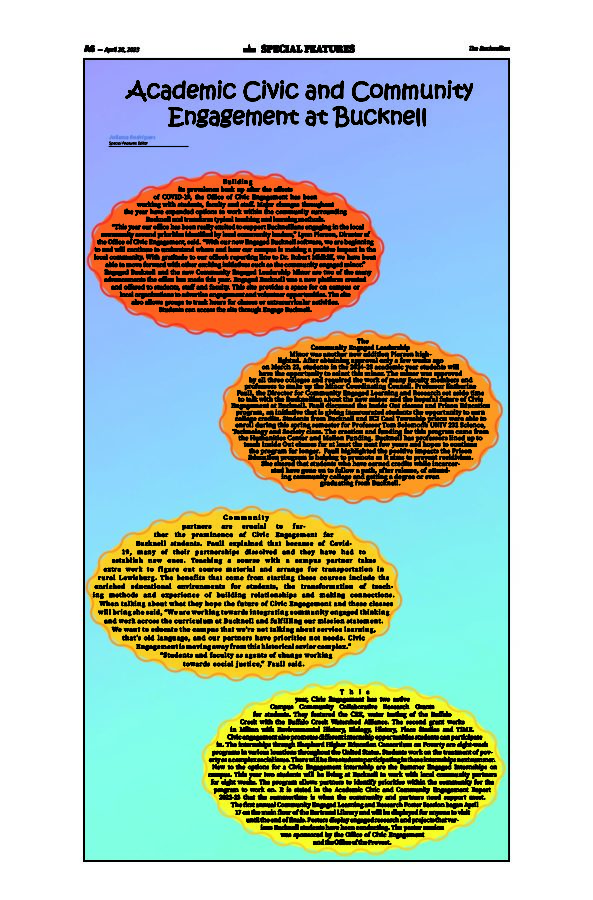Academic Civic and Community Engagement at Bucknell
April 28, 2023
Building its prevalence back up after the effects of COVID-19, the Office of Civic Engagement has been working with students, faculty and staff. Major changes throughout the year have expanded options to work within the community surrounding Bucknell and transform typical teaching and learning methods.
“This year our office has been really excited to support Bucknellians engaging in the local community around priorities identified by local community leaders,” Lynn Pierson, Director of the Office of Civic Engagement, said. “With our new Engaged Bucknell software, we are beginning to and will continue to understand where and how our campus is making a positive impact in the local community. With gratitude to our office’s reporting line to Dr. Robert Midkiff, we have been able to move forward with other exciting initiatives such as the community engaged minor.”
Engaged Bucknell and the new Community Engaged Leadership Minor are two of the many advancements the office has made this year. Engaged Bucknell was a new platform created and offered to students, staff and faculty. This site provides a space for on campus or local organizations to advertise engagement and volunteer opportunities. The site also allows groups to track hours for classes or extracurricular activities. Students can access the site through Engage Bucknell.
The Community Engaged Leadership Minor was another new addition Pierson highlighted. After obtaining approval only a few weeks ago on March 23, students in the 2024-25 academic year students will have the opportunity to select this minor. The minor was approved by all three colleges and required the work of many faculty members and professors to make up the Minor Coordinating Council.
Professor Katherine Faull, the Director for Community Engaged Learning and Research set aside time to talk with the Bucknellian about the new minor and the hopeful future of Civic Engagement at Bucknell.
Faull discussed the Inside Out classes and Prison Education program, an initiative that is giving incarcerated students the opportunity to earn college credits. Students from Bucknell and SCI Coal Township prison were able to enroll during this spring semester for Professor Tom Solomon’s UNIV 232 Science, Technology and Society class. The creation and funding for this program came from the Humanities Center and Mellon Funding. Bucknell has professors lined up to teach Inside Out classes for at least the next few years and hopes to continue the program far longer.
Faull highlighted the positive impacts the Prison Education program is helping to promote as it aims to prevent recidivism. She shared that students who have earned credits while incarcerated have gone on to follow a path, after release, of attending community college and getting a degree or even graduating from Bucknell.
Community partners are crucial to further the prominence of Civic Engagement for Bucknell students. Faull explained that because of Covid-19, many of their partnerships dissolved and they have had to establish new ones. Teaching a course with a campus partner takes extra work to figure out course material and arrange for transportation in rural Lewisburg. The benefits that come from starting these courses include the enriched educational environments for students, the transformation of teaching methods and experience of building relationships and making connections.
When talking about what they hope the future of Civic Engagement and these classes will bring she said, “We are working towards integrating community engaged thinking and work across the curriculum at Bucknell and fulfilling our mission statement. We want to educate the campus that we’re not talking about service learning, that’s old language, and our partners have priorities not needs. Civic Engagement is moving away from this historical savior complex.”
“Students and faculty as agents of change working towards social justice,” Faull said.
This year, Civic Engagement has two active Campus Community Collaborative Research Grants for students. They featured the CEE, water testing of the Buffalo Creek with the Buffalo Creek Watershed Alliance. The second grant works in Milton with Environmental History, Biology, History, Place Studies and TIME.
Civic engagement also promotes different internship opportunities students can participate in. The internships through Shepherd Higher Education Consortium on Poverty are eight-week programs in various locations throughout the United States. Students work on the treatment of poverty as a complex social issue. There will be five students participating in these internships next summer.
New to the options for a Civic Engagement internship are the Summer Engaged Internships on campus. This year two students will be living at Bucknell to work with local community partners for eight weeks. The program allows partners to identify priorities within the community for the program to work on. It is stated in the Academic Civic and Community Engagement Report 2022-23 that the summertime is when the community and partners need support most.
The first annual Community Engaged Learning and Research Poster Session began April 17 on the main floor of the Bertrand Library and will be displayed for anyone to visit until the end of finals. Posters display engaged research and projects that various Bucknell students have been conducting. The poster session was sponsored by the Office of Civic Engagement and the Office of the Provost.






















